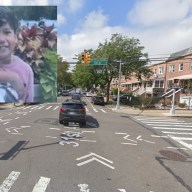“When Irish Eyes Are Smiling”
There’s a tear in your eye
And I’m wondering why
For it never should be there at all
With such pow’r in your smile
Sure a stone you’d beguile
So there’s never a teardrop should fall-”
By Joan Brown Wettingfeld
A Song for Remembrance
“When Irish Eyes Are Smiling”
There’s a tear in your eye
And I’m wondering why
For it never should be there at all
With such pow’r in your smile
Sure a stone you’d beguile
So there’s never a teardrop should fall-”
Written in 1912, this famous ballad has been a favorite of men and women over the years whether they were of Irish extraction or not. It seems appropriate to tell some of its story, for it touches on my life and the history of this area.
Recently I read of the death of a classmate of mine, Rosemary Graff McMahon, who attended Barnard College with me. She had called a while ago because she had planned to send me material about her father, the famed lyricist George Graff Jr., who wrote the words to the song “When Irish Eyes Are Smiling,” which Chauncey Olcott made famous.
With St. Patrick’s Day a highlight of March, I thought it appropriate to convey the history of this song since its lyricist had connections to Flushing. Rosemary attended Flushing High School and we had the same circle of friends.
A perennial favorite, especially at this time of year, “When Irish Eyes Are Smiling” was written in 1912 with lyrics by Olcott and Graff and music by Ernest Ball. It was made famous by Olcott, who came to Broadway from the minstrel stage. He made a career out of writing and starring in musicals.
He wrote and sang of Erin, at the time an impoverished land on the brink of revolution. Historians have noted the nostalgia of Irish Americans who left their native land and remember Ireland as a “mythic motherland” and place of extraordinary beauty.
With the aid of Olcott’s prodigious popularity, Tin Pan Alley of the early 20th century evoked an Ireland of enchantment. It was Graff who wrote many of the lyrics of the songs Olcott made famous.
During the pre-World War I era Graff wrote the lyrics for “Wake Up America” and “Every Little Bit Helps.”
The “heart throb” of his time, Olcott was born in Buffalo in 1858. He achieved his fame as a composer, lyricist and singer of ballads, most of which were Irish in style. His first job was singing ballads on the stage of Buffalo’s Academy of Music, and he later joined the Thatcher, Primrose and West Minstrels troupe.
Olcott appeared in a theater in New York’s Union Square with the Lillian Russell Opera Co. in leading roles in operettas. In 1890 he went to London and took voice lessons and sang in light opera and shows produced by Augustus Pitou. Eventually Olcott was to score many of the plays for which Pitou wrote the librettos.
Olcott wrote the hit song “Minstrel of Clare” in 1896, followed by a number of other famous songs including the popular and enchanting “My Wild Irish Rose” in 1899.
Olcott continued to write operettas when he returned to the United States and collaborated with Ball and Graff. Ball wrote the music and Olcott and Graff wrote the words.
Olcott came from humble beginnings in Lockport, N.Y., living in what he described as an “Irish shanty” on the banks of the Erie Canal. He went to school in Buffalo and his talents as a singer were recognized when he was just a boy.
He became a success in minstrel shows because of the quality of his voice, described as a light lyrical tenor, and theater managers encouraged him to sing Irish ballads and take the lead in plays, operas and operettas. He later starred in “Pinafore” and the “Mikado” in New York before he left for London to study voice for three years.
During his career, Olcott made famous a number of ballads including “Mother Machree,” “A Little Bit of Heaven” and “Sure They Call it Ireland.” In 1925 while touring in “The Rivals” he became seriously ill and never appeared on stage again. He died March 18, 1932 in Monte Carlo and is buried in Woodlawn Cemetery.
After Olcott’s death, his wife wrote his biography, “A Song in His Heart.” In 1944 the movie “Irish Eyes Are Smiling” was made and starred Gregory Ratoff.
“When Irish Eyes Are Smiling” is a song that has touched my heart during my lifetime, and I am sorry to have missed the opportunity to know more of its story, but I shall always remember Rosemary as a friend of my schooldays long ago.
Joan Brown Wettingfeld is a historian and free-lance writer and can be reached by e-mail at jbbay@aol.com.

































